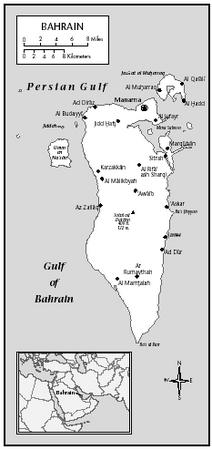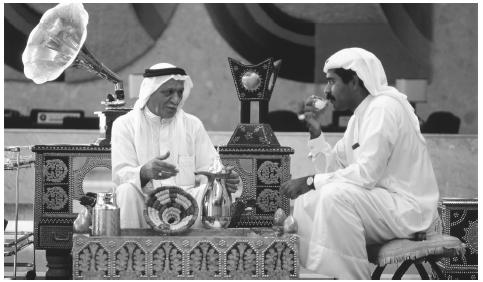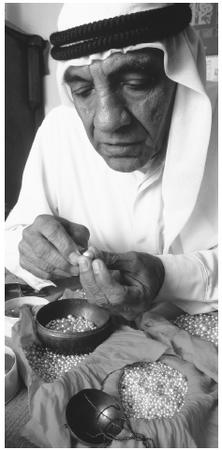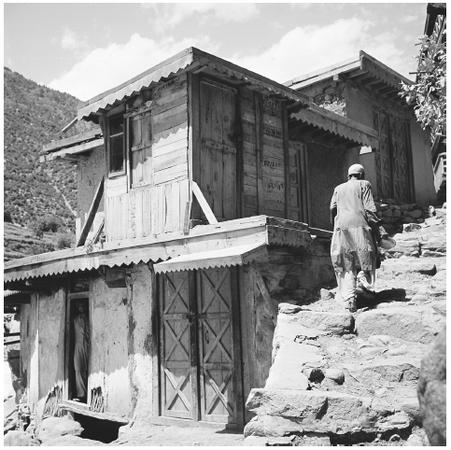Bahrain
Culture Name
Bahrani
Orientation
Identification. In ancient times, Bahrain was part of an empire known as Dilmun. It was later called Tyros by the Greeks. The name "Bahrain" is derived from the Arabic word Bahr , meaning "sea."
Location and Geography. Bahrain is an archipelago made up of Bahrain Island and thirty smaller islands. It is located in the Persian Gulf near the Arabian Peninsula, 120 miles southwest of Iran, 14 miles to the east of Saudi Arabia, and 17 miles to the west of the Qatar Peninsula. The main island, which accounts for seven-eighths of the country's area, is thirty miles from north to south and ten miles from east to west. The total area of the country is 240 square miles (620 square kilometers).
The highest point is Ad-Dukhan Hill in the center of Bahrain Island. This area is surrounded by sandy plains and salt marshes. Along the north and northwest coast, there are some springs and aquifers that are used for irrigation. Only 1 percent of the land is arable.
The climate is humid for much of the year, but the country suffers from a scarcity of rainfall which averages three inches a year, falling almost entirely in the winter. Despite the dry climate, the country is home to about two hundred species of desert plants as well as gazelles, hares, desert rats, and mongoose.
Demography. According to the CIA World Factbook, the estimated population in 2000 was 634,137. The majority of these people are Arabs. There are many temporary immigrant workers, and one-third of the population is foreign-born. Nineteen percent of the population is Asian, 10 percent is non-Bahraini Arab, and 8 percent is Irani. There are significantly more men than women. The population is growing rapidly with a high birthrate and a low death rate. One-third of the people are less than fifteen years old.
Linguistic Affiliation. Arabic is the official language and the language of daily life. English is understood in many places and Farsi and Urdu also are spoken by the large numbers of Indian and Persian residents.
Symbolism. The national flag is red with a white serrated band of eight points along the left side.
History and Ethnic Relations
Emergence of the Nation. Archaeological evidence dating back to the third millennium B.C.E. indicates that the main island probably was settled by Sumerians. Around 2000 B.C.E. it was known as Dilmun and served as a trading post on the route between Sumeri and the Indus Valley. In the fourth century C.E. Bahrain was annexed into the Sasanian Empire. In the seventh century, Muslims conquered the area and ruled until the sixteenth century. In 1521, Portugal took control, using Bahrain as a pearling post and military garrison. This situation lasted until 1602, when the Persians wrested the country from the Portuguese. The ruler Ahmad ibn Al Khalifah took control from the Persians in 1783; his descendants lead the country to this day.
In the 1830s, the British signed several treaties with Bahrain, offering protection from the Turks in exchange for access to the Persian Gulf. In 1869, Britain put its own emir in place. In 1935, it placed its main Middle Eastern naval base in Bahrain, and in 1946, it stationed the senior British officer in the region there.
Anti-British sentiment rose in the 1950s, but Britain did not decide to pull out until 1971. Bahrain officially declared its independence on 14 August of that year.

Although oil was discovered in 1902, drilling did not begin in earnest until the 1930s. The 1970s and 1980s saw a dramatic rise in the price of oil, which benefitted the economy significantly. In the late 1980s, when other countries in the area experienced economic difficulties, Bahrain maintained its prosperity thanks to earlier economic diversification.
In the 1990s, the country suffered from internal and external problems that began with a push for democratic reforms. When the emir turned this request down, widespread rioting broke out. The country's shaky relations with Iraq led it to cooperate with United Nations' efforts to monitor that nearby country. The United States military buildup in the area also created a tense relationship between Bahrainis and American troops.
National Identity. Bahrainis self-identify as part of the Arab world. There are tensions between the Sunni and Shi'ite Muslims, and religious affiliation is of primary importance in defining one's identity.
Ethnic Relations. Expatriates constitute 20 percent of the population. They come mainly from other Arab nations but also from India, Pakistan, Southeast Asia, Europe, and America. While relations are not unfriendly, foreigners generally are not integrated into Bahraini society. The vast majority are temporary workers and thus constitute a transient population.
Urbanism, Architecture, and the Use of Space
Four-fifths of the population lives in cities, the majority in Manama which is the capital and the largest urban center. That city stands on a seabed, parts of which were recently reclaimed from the water. Manama has modern buildings and wide, tree-lined roads as well as an older section with a traditional souk, or marketplace.
Muharraq is the oldest town, and used to be the capital. The city has been modernized, but in the old sections one can still see traditional architecture. The houses have tall gates and shuttered windows and are designed around a central enclosed garden or courtyard. Some have wind towers, an old-fashioned form of air-conditioning. These towers are open on four sides at the top to direct passing breezes into the house.
Most rural villages have electricity and running water and are connected to the towns by paved roads. Traditional houses, called barastis, were made from palm branches, but today most villagers build homes from modern materials.
Food and Economy
Food in Daily Life. The best-known dish, machbous, consists of fish or meat served with rice. A dessert called muhammar is made of brown rice and sugar or dates. Halwa is another traditional sweet, a green, sticky dessert filled with spices and nuts. Snacks known as sambousas are also popular; these are pastries filled with meat and cheese or sugar and nuts.
Food Customs at Ceremonial Occasions. Muslim holidays are often the occasion for large family meals. The breaking of the fast month of Ramadan is celebrated with feasts of traditional food, and a variety of special sweets and pastries.
Basic Economy. Only 1 percent of the land is arable, and so the country is unable to produce enough food for its population and relies almost entirely on imports. The primary employers are industry, commerce, and services (79 percent of workers are in these fields) and government (20 percent); the remaining 1 percent of the people are farmers. A large number of jobs are held by foreigners, and employment is an ongoing problem, particularly among young people. Three-fifths of the workforce is foreign-born.
The economy is based largely on petroleum production and processing, which account for 60 percent of exports and 30 percent of the gross domestic product (GDP). Bahrain also has well-developed communications and transportation, which has allowed it to become a center for banking and finance, and is the headquarters for a number of multinational firms that do business in the Persian Gulf area.
Commercial Activities. The country produces fruits and vegetables, poultry, dairy products, shrimp, and fish that are sold in the souks, along with locally produced handicrafts. Tourism is a growing business, accounting for 9 percent of the GDP. A good deal of international banking is conducted in Bahrain.
Major Industries. The main industry is petroleum production, processing, and refining. Others industries are aluminum smelting, offshore banking, ship repairing, and tourism. The country also produces cement blocks, plastics, asphalt, paper products, and soft drinks.
Trade. Imports and exports are roughly equal in value. Petroleum accounts for 60 percent of exports, and aluminum for 7 percent. These are exports sent mainly to India, Japan, Saudi Arabia, South Korea, and the United Arab Emirates. Forty-one percent of imports consist of crude oil, which the country processes. Imports, which also include machinery, transportation equipment, and food, come from Saudi Arabia, the United States, the United Kingdom, Japan, and Germany.
Division of Labor. Seventy-nine percent of the workforce is in industry, commerce, and services; 20 percent is in the government; and 1 percent in agriculture. Many jobs are held by foreign temporary workers, who account for over 60 percent of the labor force. Expatriates work in every field from manual labor to investment banking.
Social Stratification
Classes and Castes. Because Bahrain is one of the wealthiest Gulf states, there are a number of well-to-do people, who are almost all well educated and live in Manama or Muharraq. However, many jobs are staffed by foreigners, and there is an unemployment rate of 15 percent among Bahrainis.
Symbols of Social Stratification. Most men wear a traditional long robe called a thobe. Wealthier people tend to wear thobes tailored in a more Western style, with side and breast pockets and collars and French cuffs. Men also wrap their heads with a scarf called a gutra. Women cover their clothes with the traditional black cloak, which goes over the head, and wear a veil of thin black gauze over the face. Some younger women in the cities leave their faces or even their heads, uncovered, but this is rare.
Political Life
Government. Bahrain is a traditional monarchy in which the king is the chief of state. He appoints a prime minister, who serves as the head of government, and a cabinet. The cabinet has legislative powers with the assistance of an advisory (or Shura ) council, which was established in 1992, whose members are appointed by the monarch. There is no suffrage, as the monarchy is hereditary, passed down to the oldest son.
Leadership and Political Officials. Political parties are prohibited, but there are several small underground leftist and Islamic fundamentalist groups. The main opposition consists of Shi'a Muslim groups that have been active since 1994, protesting unemployment and the dissolution in 1975 of the National Assembly, an elected legislative body.
Social Problems and Control. The legal system is based on a combination of Islamic law and English common law. Most potential laws are discussed by the Shura council before being put into in effect.
Military Activity. The military consists of a ground force, navy, air force, coast guard, and police

Social Welfare and Change Programs
Bahrain is a welfare state. Medical care is free and comprehensive for both nationals and expatriates. There are programs that provide for the elderly and the disabled. There is an institute for the blind and one for the physically handicapped.
Nongovernmental Organizations and Other Associations
Groups such as the World Health Organization (WHO) and UNESCO send workers to Bahrain. The country is also a member of the World Trade Organization and the United Nations.
Gender Roles and Statuses
Division of Labor by Gender. Women are responsible for all domestic work, and few are employed outside the home (only 15 percent of the workforce is female). This is beginning to change as more girls gain access to an education, and foreign influence has modified traditional views of women's roles. There are no women represented in the government.
Relative Status of Women and Men. In the Islamic tradition, women have a lower status than men and are considered weaker and in need of protection. Bahrain has been more progressive than other Arab nations in its treatment of women. The first school for girls was opened in 1928, nine years after the first boys' school.
Marriage, Family, and Kinship
Marriage. While arranged marriage is still common, the bride and groom often have a chance to meet before they marry. While it was traditional for girls to be married at twelve or thirteen years of age, they now tend to wait until they have finished their education and have a job. Upon marriage, a sum of money is paid to the bride by the groom's family. Sometimes she keeps it for herself, but usually the couple uses it to set up a home. Weddings are huge, often with five or six hundred guests. A wedding involves large meals, a religious ceremony, and a henna party in which the bride's attendants decorate her with elaborate patterns. Sometimes celebrations are mixed, but usually they are divided along gender lines.

Domestic Unit. Traditionally, extended families lived together under one roof: parents, children, grandparents, and other relatives. A groom would bring his bride to live with his family. Today it is becoming more common for young couples to live apart from their parents.
Socialization
Child Rearing and Education. Boys and girls are raised separately and according to different standards. From an early age girls have much more responsibility than their brothers, who have more freedom to play and amuse themselves. Education is free. Primary school lasts for six years, intermediate school for three years, and secondary school for another three years. The literacy rate is 85 percent: 89 percent among males and 79 percent among females.
Higher Education. There are two universities in the country: the University of Bahrain with nine thousand students and the Arabian Gulf University at Manama with seven hundred. The College of Health Sciences trains nurses and hospital technicians. Many families that can afford to do so send their children abroad for higher education.
Etiquette
Greetings are generally lengthy and involve asking about each other's health and family, although a man does not ask about another man's wife. Everyone stands when someone enters the room, and that person then makes the rounds, shaking hands. After shaking, one touches the hand to the heart in a gesture of affection. Women and men can shake hands, but only if it is initiated by the woman. It is traditional upon visiting someone to be served coffee or tea. This custom includes visits to shops or offices. Failure to make such an offer or to accept it is considered rude.
Religion
Religious Beliefs. Seventy percent of the population is Shi'a Muslim, 15 percent is Sunni Muslim, and the remaining 15 percent is Christian or Jewish or follows indigenous practices. Muslims believe in the equality of all people before Allah. There are several differences between the Sunni and Shi'a sects of Islam. While most Muslims in the world are Sunni, in Bahrain, the majority are Shi'ite. The two groups split in 661, when the Sunnis refused to acknowledge Ali, whom the Shi'ites recognized as their leader.
Religious Practitioners. There are no priests or clergy in Islam. There are men who study the Quran (the Muslim holy book) and lead prayers and readings from the text. The Quran, rather than religious leader, is considered the ultimate authority and holds the answer to any question or dilemma one might have. Muezzins give the call to prayer and are scholars of the Quran who spend their lives studying and interpreting the text. Sunnis elect their religious

Rituals and Holy Places. The most important observation in the Islamic calendar is Ramadan. This month of fasting is followed by the joyous feast of Eid al Fitr, during which families visit and exchange gifts. Eid al-Adha commemorates the end of Muhammed's Hajj. The mosque is the Muslim house of worship. Outside the door there are washing facilities, as cleanliness is a prerequisite to prayer, demonstrating humility before God. One must remove one's shoes before entering the mosque. According to Islamic tradition, women are not allowed inside. The interior has no altar; it is simply an open carpeted space. Because Muslims are supposed to pray facing Mecca, there is a small niche carved into the wall pointing out the direction in which that city lies.
Death and the Afterlife. Death is not acknowledged with great ceremony. People are buried under simple gravestones that face Mecca. When an important person dies, the house often is closed for a period of time.
Medicine and Health Care
The state of health care has improved significantly since independence. The nation has virtually eliminated tropical diseases and raised the life expectancy to seventy-one years for men and seventy-six years for women. There is a large modern hospital in the capital and many local health centers that focus on preventive care. There are facilities to train doctors and nurses, but many medical personnel are foreigners. Particularly in rural areas, some people still rely on traditional herbal cures made from palm tree flowers, pollen, and buds.
Secular Celebrations
National Day is celebrated on 16 December.
The Arts and Humanities
Support for the Arts. Manama has several galleries that show the works of both nationals and expatriates. Government programs preserve traditional arts and crafts and encourage poor women to take up these art forms to supplement their family income. The Bahrain Museum and the National Heritage Center showcase traditional works.
Literature. Bahrain has a strong literary tradition. Most of the work produced is in the classical Arabic style. Well-known contemporary poets that write in this style include Qasim Haddad, Ibrahim al'Urayyid, and Ahmad Muhammed Al Khalifah. Many younger poets are more influenced by Western literature and write free verse, often with personal and political content.
Graphic Arts. The village of Sanabis is known for elaborate embroidery, often with gold thread, which the women sew onto their traditional dresses and cloaks. Fabric weaving also is practiced, as is the weaving of mats from sea grasses. Another popular craft is the production of dhows, boats made of wood, according to a traditional design that does not use metal nails. Old-fashioned dhows have sails, and more modern ones use diesel engines.
Performance Arts. The music of Bahrain follows the traditional Arabic mode. It is elaborate and repetitive. It is played on the oud (an ancestor of the lute) and the rebaba (a one-stringed instrument). Bahrain also has a folk dance tradition. The ardha is a men's sword dance, which is accompanied by drumming and by a poet, who sings the lyrics.
The State of the Physical and Social Sciences
Most scientific research focuses on the oil economy. Bahrain has developed advanced technology for petrochemical plants and oil refineries. While developed primarily for domestic use, Bahrain has also sold some of this technology to other countries.
Bibliography
Al Kalifa, Hammad bin Isa. First Light: Modern Bahrain and Its Heritage, 1994.
Al Muraikhi, Khalil M. Glimpses of Bahrain from Its Past, 1991.
Amnesty International. "Bahrain: Women and Children Subject to Increasing Abuse," July 1996.
"Bahrain," Aquastat, March 1997.
Bu Shahri, Ali Akbar. Dilmun Culture, 1992.
Byman, Daniel L. and Jerrold D. Green. "The Enigma of Political Stability in the Persian Gulf Monarchies." Middle East Review of International Affairs, September 1999.
Crawford, Harriet. Dilmun and its Gulf Neighbors, 1998.
Darwish, Adel. "Rebellion in Bahrain." Middle East Review of International Affairs, March 1999.
Hassall, S. and P. Hassall. Let's Visit Bahrain, 1985.
Littleton, Judith. Skeletons and Social Composition: Bahrain 300 BC – AD 250, 1998.
Robison, Gordon, and Paul Greenway. Bahrain, Kuwait, and Qatar, 2000.
U.S. Department of State, Bureau of Democracy, Human Rights, and Labor. "Bahrain Country Report on Human Rights Practices for 1997," 30 January 1998.
Web Sites
Destination Bahrain, 2000, www.lonelyplanet.com/dest/mea/bah
U.S. Department of State, Central Intelligence Agency. World Factbook: Bahrain, 2000, www.odci.gov/cia/publications/factbook/geos/ba
—E LEANOR S TANFORD
As Bahraini, I have enjoyed reading it…
My only comment is; I do not believe that the photo pasted at the site do related to Bahrain… I am not sure, but the hilly land structure is not common at our Island, except at Sekheir area where it never was a residential area.
Thank you
Thanks!
I totally agree that the last picture dosen't relate to Bahrain.
Kind Regards.
thankyou!
if to do business in bahrin on the basis of the their culture and social environment ,what business is best to start?
and how their culture and social environment affect to business.
Yes Yes This is my country:D
About the universities in Bahrain ,not only two. Now become more than 8 with diffrent studies
and also if you cnected withthe googl erth to showing the mape of the contery it well be good.
*and we need to see all that menshend the calcher it hase to seport by riferns imag it well be claer to show for the porsen that youtising this web >
thank you a lot! for the abov infrmtion.
simple examples
- you state that 15 % of work force is female, in 2008 the number was 34 % and that is still dated to me.
- the bits about education can now be considered completely false.
- 2001 Bahrain became a constitutional monarchy;a newer constitution was established and voted into law in 2001
- political parties are no longer prohibited there are 3 major parties and some minor
- all of you numbers about GDP and expenditure are wrong
- the traditional garb is correct for males and mostly correct for females though i should mention the veil cover not widely used; mainly among older women, and extremely religious households.( it isn't law and and people wear as much or as little as they choose)
- population number, nationals number, work force numbers need updating
some comments here are in 2012 and thanking you for some extremely dated information, might not seem important to you but actual facts about my country are important to me.
Does anyone know much about shipping methods once the items are there?
Thank you any help.
I found the article interesting but the comments were more interesting...and seem factual.
I wonder if anyone from Bahrain who is reading this article can help me finding a job in Bahrain as Love to work in the country. I have extensive experience in Manufacturing and Management.
Regards.
Ganesan
Thanks to give me a more information about the bahrain
here soon!
Religious Beliefs. Seventy percent of the population is Shi'a Muslim, 15 percent is Sunni Muslim, and the remaining 15 percent is Christian or Jewish or follows indigenous practices. WTH Please check your information. And renew your sources because you are certainly wrong.
This is a very useful article. Here, I also wanna recommend that Bahraini students can find local tutors on LearnPick.